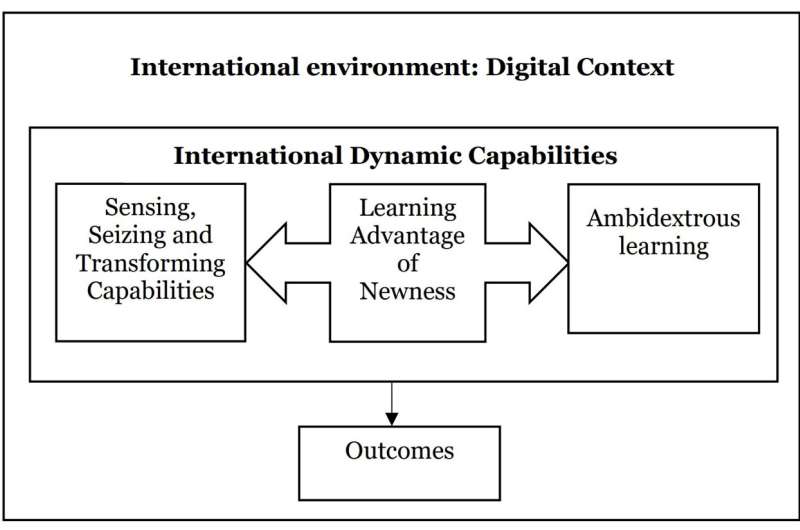Theoretical framework of the study. Credit: Early Internationalization in the Digital Context—A Capabilitiesbased Approach (2022).
The use of social media can be beneficial to international new ventures and help them to survive. A new study from the University of Vaasa, Finland, shows that newly established international firms and start-ups with limited resources can effectively use social media to learn about their new foreign markets and customers in a fast and inexpensive way.
For any international new venture, acquiring enough foreign market knowledge can be a matter of life and death. According to Emmanuel Kusi Appiah's doctoral dissertation, an international new venture can use social media, and then employ ambidextrous learning in its knowledge development process. Ambidextrous learning means using two diverse ways of learning: exploratory learning and exploitative learning.
Exploratory learning helps the company to discover new threats and opportunities in its environment. Exploitative learning, on the other hand, utilizes the current market information the firm already has.
"A company can use social media for exploitative learning, but also for exploratory learning to survive in foreign markets. The company can also switch between these two approaches, according to the situation and company strategy. The use of social media has a positive impact on ambidextrous learning," says Emmanuel Kusi Appiah.
Firms can benefit from social media platforms like LinkedIn and Facebook in their networking efforts. In addition, social media tools such as Buzzsumo, Tagboard and AgoraPulse can provide the necessary knowledge about customers, competitors, and existing and new markets, thereby reducing the difficulties a new firm would otherwise face in foreign markets. Acquiring knowledge is usually more difficult when a firm is new, especially if it is new and foreign.
Ambidextrous learning can help firms to combine new external knowledge with existing knowledge and prevent inefficiency and short-sightedness. It can also help firms to achieve a sustainable competitive advantage.
Emmanuel Kusi Appiah reminds us that applying ambidextrous learning is not straightforward. Entrepreneurs and companies that are planning to move into a new market internationally need to understand the drivers and mechanisms that support ambidexterity. The dissertation provides valuable information regarding this aspect.
More information: Dissertation: osuva.uwasa.fi/handle/10024/14688
Provided by University of Vaasa
























